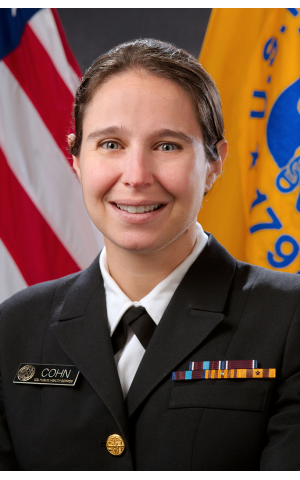CDC Expert Weighs in on Vaccination Debate
How do we assess the practice of some parents allowing an unvaccinated child to go into public places to possibly infect others?
After 37 years with the Atlanta Journal-Constitution and now with the AJT, , Jaffe’s focus is lifestyle, art, dining, fashion, and community events with emphasis on Jewish movers and shakers.
The national debate continues between measles outbreaks on the one hand and parents with scary stories about the side effects of vaccines on the other. Since the beginning of the year, the Centers for Disease Control and Prevention confirmed 101 cases of measles in 10 states. The largest outbreaks were in New York, tied to the Orthodox community. It is reported to be the worst outbreak in decades.
How do we assess the practice of some parents to allow an unvaccinated child to go into public places to possibly infect others?
Dr. Amanda Cohn, a Centers for Disease Control and Prevention pediatrician, has three daughters at The Epstein School and Riverwood High School. A member of Congregation Or Hadash, Cohn runs the expert advisory committee that makes immunization recommendations for children and adults in the U.S.
She previously worked on vaccine projects in Africa, including an Ebola vaccine clinical trial in Sierra Leone.

Cohn, an Atlanta native, serves as executive secretary of the CDC Advisory Committee on Immunization Practices and is senior advisor for vaccines for the CDC’s National Center for Immunization and Respiratory Diseases. She is board certified in pediatrics and is a fellow of the American Academy of Pediatrics. She obtained her medical degree from Emory University School of Medicine and completed a residency in pediatrics at Boston Children’s Hospital and Boston Medical Center.
This is what she had to say about the vaccine debate.
Jaffe: When did all this drama and misinformation about childhood vaccinations evolve?
Cohn: There was a paper published in 1998 claiming a link between autism and the MMR [measles, mumps and rubella] vaccine. This paper was later retracted, and it was determined that the data was fraudulent. However, this paper had a major long-term negative impact in vaccine confidence around the world.
Since that time, multiple large and high-quality studies have been conducted that demonstrate there is not an association between autism and MMR vaccine. In 2004, the Institute of Medicine reviewed all available data and concluded there is no causal association between vaccines and autism.
Parents of children with autism and other developmental disorders are looking for answers, and understanding the combination of environmental and genetic factors that may lead to autism is important. However, vaccines are not part of the answer parents are looking for. Vaccines are very safe and protect young children from serious infectious diseases that can cause hospitalization and death. It’s important to me that parents who do have questions about vaccines talk to their healthcare provider so they can feel confident in making the decision to vaccinate.
Jaffe: How have the schools responded? Didn’t the Jewish day schools send out a letter not allowing children to attend without proof of vaccination?
Cohn: I can’t respond specifically about what local Jewish day schools are doing, but Georgia does have state immunization requirements for children attending school. Having high vaccination coverage in schools protects not just the child, but also protects against outbreaks of disease, and can protect children who are unable to get vaccinated for medical reasons from being exposed to vaccine-preventable diseases.
Jaffe: What has transpired in religious communities in New York recently and how was it resolved?
Cohn: The measles outbreaks in the Jewish religious communities in New York demonstrate how contagious measles is and what happens when you have pockets of unvaccinated people. Measles infects more than 90 percent of people who are exposed and susceptible, and even with the best of care, measles can cause swelling of the brain (encephalitis) and death.
Travelers to Israel imported measles back to their home communities and it spread because of low vaccination rates. Public health and religious leaders worked closely to communicate the potential severity of measles and the safety and effectiveness of the measles vaccine, which has resulted in thousands of people getting vaccinated, which will hopefully end the outbreak.
Jaffe: Looking forward, what remarkable wish list vaccinations are on the horizon?
Cohn: Vaccines are one of the most impactful achievements in public health. We now have vaccines to prevent 18 diseases throughout the lifespan, preventing thousands of deaths in the U.S. annually. I am most excited about development of vaccines to prevent infectious diseases for which there are currently high levels of antibiotic resistance, such as MRSA [Methicillin-Resistant Staphylococcus Aureus] and vaccines preventing disease in young infants by vaccinating pregnant women.
Where I think we have the most opportunity is by getting more adults to get vaccinated with vaccines we already recommend, such as the flu vaccine, the pneumonia vaccines, and the shingles vaccine. I strongly encourage you to not only make sure your children are vaccinated, but also to make sure you and your parents have received all the recommended vaccines.
- Marcia Caller Jaffe
- Health and Wellness
- Community
- Centers for Disease Control and Prevention
- CDC
- The Epstein School
- Riverwood High School
- Congregation Or Hadash
- Vaccines
- Immunization
- American Academy of Pediatrics
- Emory University School of Medicine
- Dr. Amanda Cohn
- Public health
- Feature
- Measles Outbreak




comments